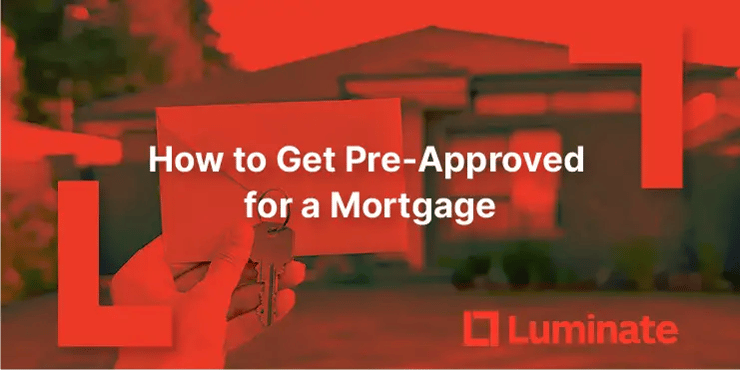How to Get Pre-Approved for a Mortgage NZ 2025 | First Home Buyers
 By
Trent Bradley
·
12 minute read
By
Trent Bradley
·
12 minute read

Quick Answer: Mortgage pre-approval in New Zealand takes 3-5 working days and requires proof of income (payslips or financials), 3 months bank statements, deposit evidence, ID, and debt details. Pre-approval confirms how much banks will lend you (typically valid 60-90 days) and makes you a stronger buyer when making offers on properties.
Table of Contents:
- What Is Mortgage Pre-Approval?
- Why Mortgage Pre-Approval Matters for First Home Buyers
- Pre-Approval vs Final Approval: Understanding the Difference
- How to Get Pre-Approved: Step-by-Step Process
- What Affects Your Pre-Approval Amount?
- Common Pre-Approval Mistakes to Avoid
- How Long Does Pre-Approval Take?
- Pre-Approval Checklist
- Frequently Asked Questions
- Final Thoughts
Key Takeaways
- Mortgage pre-approval takes 3-5 working days and confirms how much banks will lend you, typically valid for 60-90 days
- Pre-approved buyers are stronger in negotiations as sellers know finance is verified, making offers more credible
- Required documents include 3 months payslips, 3 months bank statements, deposit evidence, ID, and all debt details
- Credit cards significantly reduce borrowing power—every $10,000 in limits can decrease capacity by $50,000-60,000
- Using a mortgage adviser gives access to 15+ lenders instead of just one bank, maximizing approval chances
- Pre-approval is conditional and still requires final approval once you find a specific property that meets lender criteria
Getting pre-approved is one of the most important steps in buying your first home in New Zealand. It gives you clarity around your budget, shows real estate agents and sellers that you're serious, and puts you in a stronger position when making an offer in competitive markets.
At Luminate Financial Group, we work with first-home buyers across Auckland, Wellington, Christchurch, and throughout New Zealand every day. Many are surprised by how much smoother the property search becomes once their pre-approval is sorted. In this guide, we'll walk you through what pre-approval means, why it matters, and exactly how to get it done—step by step.
What Is Mortgage Pre-Approval?
A mortgage pre-approval (also called conditional approval, approval in principle, or AIP) is a written confirmation from a New Zealand bank or lender stating that you meet their lending criteria and they're willing to lend you a specific amount, subject to a few final conditions.
What pre-approval tells you:
- Maximum loan amount you can borrow
- Maximum property purchase price you can afford
- Required deposit amount
- Estimated repayment amounts
- Any conditions that must be met
- Validity period (typically 60-90 days)
It's not a final guarantee—you'll still need formal approval once you've found a specific property—but it's the closest thing to a green light you can get before you start house hunting.
Once you're pre-approved, you know your maximum purchase price, what deposit you'll need, and what your weekly repayments might look like. This helps you avoid wasting time viewing homes outside your range and gives you the confidence to move quickly when the right property comes along.
Continued Resources:
- Pre-Approval Preparation Checklist
- Pre-Approval Preparation Quiz
- Mortgage Pre-Approval Checklist
- Mortgage Pre-Approval Quiz
Why Mortgage Pre-Approval Matters for First Home Buyers
You Know Your Real Budget
Without pre-approval, you're guessing. You might think you can afford a $750,000 property, but the bank may only lend you enough to buy a $650,000 property based on your income, debts, or deposit size. Pre-approval removes this uncertainty before you fall in love with an unaffordable home.
You Become a Stronger Buyer
When you're pre-approved, you become a more attractive buyer in New Zealand's competitive property market. Sellers and real estate agents are more likely to take your offer seriously because they know you have verified finance in place. In multiple-offer situations, this can make all the difference.
Real estate agents prioritize pre-approved buyers because:
- Lower risk of finance clause delays or failures
- Faster settlement timeframes possible
- More serious and committed buyers
- Reduced time wasted on unqualified prospects
You Can Identify Issues Early
Pre-approval gives you time to fix any problems early—like missing documents, high credit card limits, poor account conduct, or credit file errors—before you're under pressure to meet a purchase deadline or settlement date.
Common issues discovered during pre-approval:
- Credit cards reducing borrowing power by $50,000+
- Insufficient deposit (forgetting about legal fees and other costs)
- Income not meeting lender criteria
- Credit file defaults or errors
- Self-employment income not adequately documented
You Can Negotiate with Confidence
Knowing exactly what you can afford and having finance arranged means you can negotiate more effectively. You can make quick decisions, remove or shorten finance clauses, and demonstrate to sellers that you're a low-risk buyer.
You Save Time
With pre-approval, you only view properties within your confirmed budget. This saves countless hours viewing homes you can't afford and prevents the disappointment of finding your dream home only to discover you can't get finance for it.
Pre-Approval vs Final Approval: Understanding the Difference
Pre-Approval (Conditional Approval):
- Based on your financial position and documents
- Does NOT require a specific property
- Valid for 60-90 days typically
- Subject to conditions (property type, valuation, clean title)
- Can be used for multiple properties during validity period
Final Approval (Unconditional Approval):
- Based on a specific property you're purchasing
- Requires property valuation
- Requires LIM report and title check
- Confirms the property meets lender security criteria
- Issued after you've signed a Sale and Purchase Agreement
- Leads directly to loan drawdown and settlement
Pre-approval gets you ready to buy. Final approval confirms the specific property and loan can proceed to settlement.
How to Get Pre-Approved: Step-by-Step Process
Step 1: Know What Documents You'll Need
Before applying for pre-approval, gather the key documents New Zealand lenders require:
Proof of Income:
- Last 3 months payslips (PAYE employees)
- Employment contract showing salary and start date
- Last 2 years tax returns (self-employed or commission earners)
- Financial statements (self-employed)
- Proof of other income (rental, investments, government payments)
Bank Statements:
- Last 3 months bank statements for all accounts
- Showing income deposits, regular expenses, and savings patterns
- Both personal and business accounts (if self-employed)
- Savings account statements
- KiwiSaver balance statement
- Gift letter from family (if deposit is gifted)
- Proof of HomeStart Grant eligibility (if applicable)
Debt Information:
- Credit card statements (all cards, even zero balance)
- Loan statements (car, personal, student)
- Buy Now Pay Later account details
- Other liabilities or commitments
Identification:
- Photo ID (passport or driver's licence)
- Proof of address (rates bill, utility bill, tenancy agreement)
- Birth certificate or citizenship documents
Property Plans (if known):
- Price range you're looking in
- Preferred locations
- Type of property (house, apartment, townhouse)
If using KiwiSaver for deposit:
- KiwiSaver withdrawal application form
- Confirmation letter from provider
- Evidence of contributions over required period
Step 2: Talk to a Mortgage Adviser (Recommended)
You can go directly to your bank, but most first-home buyers benefit from using a mortgage adviser. Here's why:
Mortgage advisers provide:
- Comparison across 15+ lenders (not just one bank)
- Understanding of different lender policies and borrowing limits
- Solutions that banks don't advertise directly
- Application preparation to maximize approval chances
- Assessment of which lenders suit your situation best
- No upfront cost (advisers are paid by lenders)
At Luminate Financial Group, we help you prepare your application, ensure everything meets current CCCFA lending rules, and guide you on how to maximize your chances of approval. We also assess which banks or lenders are most likely to approve your application based on your specific situation.
Going direct to your bank vs using an adviser:
| Direct to Bank | Through Adviser |
|---|---|
| One lender option only | 15+ lender options |
| Bank's products only | Access to non-bank lenders |
| May not optimize application | Strategic application preparation |
| Single credit check | Smart approach to protect credit score |
| Bank's policies only | Understands all lender differences |
This saves you time and avoids unnecessary credit checks that could negatively affect your credit score.
Step 3: Prepare Your Finances
Before submitting your pre-approval application, optimize your financial position:
Actions to take 1-3 months before applying:
- Pay off or close unused credit cards
- Reduce credit card limits you're keeping
- Avoid taking on new debt (no car loans, personal loans)
- Build consistent savings patterns
- Clean up bank statement history (reduce overdrafts, gambling)
- Avoid job changes if possible
- Don't make large unexplained cash deposits
Red flags that reduce approval chances:
- Frequent overdrafts or dishonored payments
- Gambling transactions in bank statements
- Multiple recent credit applications
- Unexplained large cash deposits or transfers
- Irregular income patterns
- High discretionary spending relative to income
Step 4: Submit Your Pre-Approval Application
Once your adviser has everything they need, they'll submit your application to one or more lenders strategically. The bank or lender will assess:
Assessment criteria:
- Income verification and stability
- Expenses (actual from statements and HEM benchmark)
- Credit history and credit score
- Debt-to-income ratio
- Loan-to-value ratio (LVR) based on deposit
- Deposit source and verification
- Employment history and stability
- Account conduct over last 3-6 months
Most pre-approvals take between 3-5 working days, though some are faster and some (particularly self-employed or complex applications) may take up to 10 working days. Your adviser will follow up with the lender and keep you informed of progress.
Step 5: Receive Your Pre-Approval Letter
The lender will issue a pre-approval letter confirming:
What your pre-approval includes:
- Maximum loan amount approved
- Maximum property purchase price
- Deposit required (amount and source)
- Loan term and structure
- Conditions that apply
- Validity period (expiry date)
Common conditions include:
- Proof of minimum deposit at settlement
- Confirmation that property is acceptable security (freehold, good condition)
- Property valuation meeting or exceeding purchase price
- Building report showing no major issues
- Property located in approved lending area
- Confirmation of KiwiSaver withdrawal (if applicable)
- No adverse changes to financial circumstances
- Final income verification at settlement
Validity period: Pre-approvals are typically valid for 60-90 days. This gives you 2-3 months to find a property. If you don't find something in time, most can be renewed (called "rolling over") as long as your financial position hasn't changed.
Step 6: Understand Your Conditions
Pre-approvals come with conditions you must meet. For example, a bank might approve your borrowing but require that the property you buy:
- Has a clean building report (no major defects)
- Is freehold (not leasehold or cross-lease in some cases)
- Is located in an approved lending area (not remote or high-risk zones)
- Has a registered valuation within 5% of purchase price
- Meets minimum building standards
- Is not subject to weathertightness claims
It's essential to understand what these conditions are so you don't run into issues later. Your adviser or conveyancing lawyer will help you check each property you're considering to ensure it meets the lender's security criteria.
Property types with stricter conditions:
- Apartments (may need larger deposit, unit title complications)
- Leasehold properties (restricted lending, shorter lease terms problematic)
- Properties with weathertightness issues
- Properties in earthquake-prone areas
- Units with body corporate issues
- Properties over 100 years old (may require specific reports)
Step 7: Start House Hunting with Confidence
Now you can actively search for properties knowing:
- Your exact maximum purchase price
- What deposit you need
- That finance is essentially arranged
- What property types are acceptable to your lender
When viewing properties:
- Focus only on properties within your pre-approved range
- Check location is acceptable to your lender
- Note any obvious issues that might affect final approval
- Be prepared to act quickly in competitive markets
- Have your adviser's contact details ready for agents
Step 8: Stay Pre-Approval Ready
Once you're pre-approved, don't assume it's set in stone. Your financial position must stay consistent throughout the validity period and until settlement.
Things that can invalidate your pre-approval:
- Taking on new debt (credit cards, loans, BNPL)
- Changing jobs or reducing work hours
- Using your deposit funds for other purposes
- Significant changes to income
- Deteriorating account conduct
- New defaults or missed payments appearing on credit file
Maintain approval by:
- Keeping bank accounts in good order
- Avoiding unarranged overdrafts or bounced payments
- Not making major purchases on credit
- Maintaining your deposit funds intact
- Staying in your current employment if possible
- Continuing to save and demonstrate financial responsibility
If your pre-approval expires before you find a home, it can usually be renewed—as long as your financial position hasn't changed significantly and you provide updated bank statements and payslips.
What Affects Your Pre-Approval Amount?
Your pre-approved amount depends on these key factors:
Income Level and Stability
Higher, stable income = higher borrowing power. PAYE employment is viewed most favorably, followed by long-term self-employment with strong financials.
Deposit Size
Larger deposit = lower LVR = higher approval chances and better rates. 20% deposit opens all lender options. Less than 20% limits your choices.
Existing Debts
Every $10,000 in credit card limits reduces borrowing power by approximately $50,000-60,000. Clearing debts before applying is crucial.
Living Expenses
Higher expenses = reduced borrowing capacity. Banks use either your actual expenses from statements or HEM benchmarks (whichever is higher).
Credit History
Clean credit file = higher approvals. Defaults, late payments, or multiple credit applications reduce approval amounts or lead to decline.
Loan Term
Longer terms (30 years) = higher borrowing capacity but more total interest. Shorter terms = lower capacity but faster debt reduction.
Interest Rate Environment
When rates are low, you can borrow more. When rates are high or rising, stress testing reduces approval amounts.
Number of Dependents
Each child increases assessed living costs by $150-250/week, reducing borrowing power by $30,000-50,000 per dependent.
Common Pre-Approval Mistakes to Avoid
Mistake 1: Applying to Multiple Banks Yourself
This triggers multiple credit checks that can damage your credit score and make you look desperate to lenders. Use one adviser who shops your application strategically.
Mistake 2: Not Knowing Your Numbers
Going into pre-approval without knowing your debts, expenses, or exact deposit amount wastes time and can lead to nasty surprises.
Mistake 3: Assuming KiwiSaver Covers All Costs
KiwiSaver can only be used for deposit or settlement costs—NOT for legal fees, LIM reports, building inspections, or moving costs. You need separate cash savings.
Mistake 4: Applying Before You're Ready
Rushing into pre-approval without optimizing your finances (closing credit cards, building savings, cleaning up bank statements) reduces your approval amount.
Mistake 5: Not Understanding Lender Conditions
Failing to understand property type restrictions, location limits, or valuation requirements leads to disappointment when perfect properties don't qualify.
Mistake 6: Making Major Financial Changes
Taking on new debt, changing jobs, or spending your deposit between pre-approval and settlement can invalidate your approval.
Mistake 7: Assuming All Properties Qualify
Not all properties meet lender security criteria. Cross-lease, leasehold, apartments with issues, remote locations, and weathertightness-prone properties often face restrictions.
Mistake 8: Letting Pre-Approval Expire
If your pre-approval expires and you haven't renewed it, you'll need to restart the entire process when you find a property, potentially losing it to faster buyers.
How Long Does Pre-Approval Take?
Standard timeline:
- Document gathering: 1-3 days
- Application submission: Same day
- Lender assessment: 3-5 working days
- Pre-approval issued: Day 4-6 typically
Factors that speed up approval:
- Complete, organized documentation
- PAYE employment with stable income
- Clean credit history
- Simple financial situation
- Using experienced mortgage adviser
Factors that slow down approval:
- Missing or incomplete documents
- Self-employment (requires detailed review)
- Complex income sources
- Credit issues requiring explanation
- Multiple debts or credit facilities
- Property market rushes (lenders backlogged)
Fastest pre-approval: Some digital-first lenders can provide conditional approval in 24-48 hours for straightforward applications.
Slowest pre-approval: Self-employed applicants with complex structures may take 7-10 working days or longer.
Pre-Approval Checklist
Use this checklist to ensure you're ready:
Before applying:
- [ ] Payslips (last 3 months) or tax returns (2 years)
- [ ] Bank statements (3 months, all accounts)
- [ ] Photo ID and proof of address
- [ ] Credit card statements and limits
- [ ] Loan details (car, personal, student)
- [ ] Deposit evidence (savings + KiwiSaver)
- [ ] Employment contract or business financials
- [ ] Closed unused credit cards (3 months ago ideally)
- [ ] Clean bank statements (no overdrafts, gambling)
During application:
- [ ] Chosen mortgage adviser or applied directly
- [ ] Application submitted to appropriate lender
- [ ] Following up on progress regularly
- [ ] Prepared to provide additional info if requested
After approval:
- [ ] Pre-approval letter received and reviewed
- [ ] Conditions understood clearly
- [ ] Validity period noted in calendar
- [ ] Property search criteria matches lender requirements
- [ ] Financial position being maintained (no new debts)
Frequently Asked Questions
How long is a mortgage pre-approval valid for in New Zealand?
Pre-approvals are typically valid for 60-90 days (2-3 months). If you don't find a property within this time, you can usually renew or "roll over" your pre-approval by providing updated bank statements and payslips, as long as your financial situation hasn't changed.
Can I get pre-approved with bad credit?
Yes, but it's more challenging. Defaults, missed payments, or low credit scores reduce your borrowing power and limit lender options. Non-bank lenders may still approve you but at higher interest rates. Work on improving your credit for 6-12 months before applying if possible.
Does pre-approval guarantee I'll get the loan?
No, pre-approval is conditional. Final approval still requires the specific property to meet lender criteria (valuation, building report, title check, location). It's very close to a guarantee, but not absolute until final approval is issued.
Do I need pre-approval before house hunting?
It's not legally required, but it's highly recommended. Without pre-approval, you're wasting time viewing properties you may not be able to afford, and sellers won't take your offers as seriously in competitive markets.
Can I get pre-approved if I'm self-employed?
Yes, self-employed applicants can get pre-approved, but you'll need 2+ years of financial statements, tax returns, and often a larger deposit (15-20%). Lenders typically assess self-employed income at 80% of declared income.
What if my pre-approval amount is lower than expected?
This usually means debts or expenses are higher than you realized, or lenders are using conservative assumptions. Work with your adviser to identify what's reducing your capacity—often it's unused credit cards, high expenses, or existing loans that can be addressed.
Can I get pre-approved for multiple properties at once?
Your pre-approval covers any property up to your approved amount that meets the lender's conditions. You can view and offer on multiple properties during your pre-approval validity period.
Does getting pre-approved affect my credit score?
Yes, there's a credit check, but one pre-approval application has minimal impact. Multiple applications to different banks independently can significantly damage your score. This is why using one adviser who shops strategically is better.
What happens if interest rates change after pre-approval?
If rates rise before you find a property, your maximum borrowing amount may be reduced when you apply for final approval due to stress testing at higher rates. If rates fall, you may be able to borrow slightly more.
Can I increase my pre-approval amount later?
Yes, if your circumstances improve (pay rise, debt paid off, larger deposit), you can reapply for a higher pre-approval amount. However, you'll need to go through the assessment process again with updated documentation.
Final Thoughts
Getting pre-approved is more than just ticking a box in the home-buying process. It's a chance to understand your financial position clearly, plan ahead strategically, and put yourself in the strongest possible position as a buyer in New Zealand's competitive property market.
When done right, pre-approval gives you confidence, speed, and leverage. You'll know exactly what you can afford, avoid wasting time on unsuitable properties, and be taken seriously by sellers and real estate agents.
At Luminate Financial Group, we specialize in helping first-home buyers get mortgage-ready. We'll guide you through every step of the pre-approval process, explain your options clearly, compare lenders to maximize your approval amount, and help you move forward with clarity and confidence.
Ready to get pre-approved with the right lender?
Book a free First-Home Planning Session with Luminate. We'll help you gather documents, prepare your application strategically, and secure a pre-approval that works for your goals and budget.
📞 Call 0800 333 400
📧 Email askus@luminate.co.nz
🌐 Visit luminate.co.nz
Luminate Financial Group - helping first-home buyers across Auckland, Wellington, Christchurch, and throughout New Zealand since 1998.

Trent Bradley
Trent Bradley is a New Zealand financial advisor specializing in property-backed finance and investment consulting. With over 26 years of experience running his mortgage broking business, he has helped wholesale investors access high-yield property-backed loan opportunities. For the past 12 years, Trent has led Luminate Finance, a New Zealand finance company dedicated to connecting investors with secure property investment solutions.


























